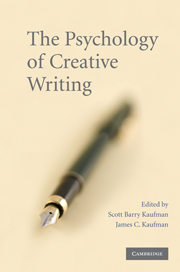Book contents
- Frontmatter
- Contents
- Contributors
- Foreword
- Preface
- Acknowledgments
- PART I THE WRITER
- PART II THE TEXT
- PART III THE PROCESS
- PART IV THE DEVELOPMENT
- 13 Writing in Flow
- 14 Writer's Block and Blocked Writers: Using Natural Imagery to Enhance Creativity
- 15 Pretend Play, Emotional Processes, and Developing Narratives
- 16 The Healing Powers of Expressive Writing
- PART V THE EDUCATION
- Index
- References
16 - The Healing Powers of Expressive Writing
Published online by Cambridge University Press: 25 January 2010
- Frontmatter
- Contents
- Contributors
- Foreword
- Preface
- Acknowledgments
- PART I THE WRITER
- PART II THE TEXT
- PART III THE PROCESS
- PART IV THE DEVELOPMENT
- 13 Writing in Flow
- 14 Writer's Block and Blocked Writers: Using Natural Imagery to Enhance Creativity
- 15 Pretend Play, Emotional Processes, and Developing Narratives
- 16 The Healing Powers of Expressive Writing
- PART V THE EDUCATION
- Index
- References
Summary
Over the past 20 years, the value of expressive writing has made the transition from anecdotal folk wisdom to a large and growing body of scientific research. Specifically, expressing thoughts and feelings about a traumatic event can improve one's mental and physical health (Frattaroli, 2006; Pennebaker, 1997; Smyth, 1998). As social and health psychologists, we give an overview of this line of research that began in the 1980s and has continued to proliferate up to the present. We now know that writing can have an impact on a broad range of physiological, physical, and mental states across many types of people. Non-health-related benefits have also been uncovered, and these are discussed as well. After describing the standard expressive writing paradigm and its application to creative writers, we discuss the role that language plays in this picture, including how language use can predict health benefits.
THE EXPRESSIVE WRITING PARADIGM
The procedure is simple and straightforward: Participants are asked to reflect on their deepest thoughts and feelings about a traumatic event. In the original studies, participants were randomly assigned to write about either an emotional topic or a control topic for 15 to 20 minutes each session for three to five sessions completed over the course of several days or weeks. One writing session was completed per day, and participants were often given the freedom to decide what time of day to write.
- Type
- Chapter
- Information
- The Psychology of Creative Writing , pp. 264 - 274Publisher: Cambridge University PressPrint publication year: 2009
References
- 12
- Cited by

